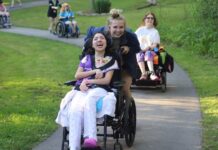Elijah Patino is a happy, healthy seven-year-old now, but it took a while to get there. For much of his life, he had a mysterious disease that made it painful to eat and painful to play. He had an uncomfortably enlarged spleen bulging in his abdomen. Something was damaging his blood cells, and he needed to get frequent intravenous immunoglobulin transfusions for anemia. His family, from Woodbridge, N.J., took him to a series of medical centers and specialists, but the doctors were puzzled.
For a while, drugs seemed to control his illness, until he experienced high, spiking fevers during a family vacation and spent two weeks in the hospital, with his prospects for medical treatment looking more and more dire.
“Elijah was on a ‘diagnostic odyssey’ a difficult journey that so many patients and families with a rare disease travel, to find the cause of their medical problems,” said Neil Romberg, MD, a pediatric immunologist at Children’s Hospital of Philadelphia (CHOP), who first examined Elijah when the boy was four. “We suspected that he had an inherited autoimmune disorder but we quickly realized his disease wasn’t in any textbook.”
Romberg and colleagues published their case report of this newly identified autoimmune disease on June 5 in the Journal of Allergy and Clinical Immunology.
Romberg used whole-exome sequencing to pinpoint the molecular cause of the problem and discovered a new disorder. The technology identified an extra copy of a gene called CD40LG. Too much CD40LG caused Elijah’s white blood cells to inappropriately attack his own organs, which in turn caused his illness. Romberg named the disorder CD40LG duplication-associated autoimmune disease.
Elijah had inherited the disorder from his mother, Noami. She also had a history of autoimmune symptoms, such as joint pain and sluggish blood flow to her fingertips, but medicine made the problems manageable. After she became pregnant with Elijah, her symptoms resolved. “This disease presents differently in females and males,” said Romberg. He explained that the CD40LG gene is X-linked—located on the X chromosome. In women, who have two X chromosomes, Mother Nature has a way to silence the abnormal, duplicated chromosome and use only the normal one. Romberg speculates that silencing may be compromised during inflammation, resulting in temporary, rather than lifelong, autoimmune symptoms.
Males have only one X chromosome, so if it is abnormal, there is no backup X chromosome to use. Romberg instead used cyclosporine A, a potent immunosuppressive drug, to control Elijah’s overactive immune system. He first tested the drug on the child’s cells in laboratory studies to determine an appropriate dosage, then treated with a very low dose tailored specifically for Elijah to avoid drug side effects.
Elijah now plays soccer and basketball with the help of a spleen guard, but with his vulnerable spleen, has to avoid heavier contact sports. With medicine muting his immune system, he has to be very careful to avoid infections. Still, his life is much smoother and less frightening than it was a few years ago.
“We were beginning to lose hope of a medical diagnosis and we were quite distressed not knowing what the outcome of his condition would be,” said Elijah’s mother, Noami Patino. “After meeting Dr. Romberg, we have renewed hope now that we know what our son has and how to treat it.”
“As with other rare disorders, the discovery of this disease may allow doctors to identify this condition in other children, and then to successfully treat them,” said Romberg. “This is an example of harnessing the power of science to deliver precise, personalized treatments to a single patient.”
Romberg holds the Jeffrey Modell Endowed Chair of Pediatric Immunology Research at CHOP. The National Institutes of Health (grants AI115001, AI124084, HD085848, and HD083185) supported this research, as did the Jeffrey Modell Foundation and the Howard Hughes Medical Institute/Burroughs Wellcome Fund.
Carole Le Coz et al, “CD40LG duplication-associated autoimmune disease is silenced by non-random X-chromosome inactivation,” Journal of Allergy and Clinical Immunology, published online Feb. 27, 2018. https://doi.org/10.1016/j.jaci.2018.02.010
Children’s Hospital of Philadelphia: Children’s Hospital of Philadelphia was founded in 1855 as the nation’s first pediatric hospital. Through its long-standing commitment to providing exceptional patient care, training new generations of pediatric healthcare professionals, and pioneering major research initiatives, Children’s Hospital has fostered many discoveries that have benefited children worldwide. Its pediatric research program is among the largest in the country. In addition, its unique family-centered care and public service programs have brought the 546-bed hospital recognition as a leading advocate for children and adolescents. For more information, visit http://www.chop.edu




